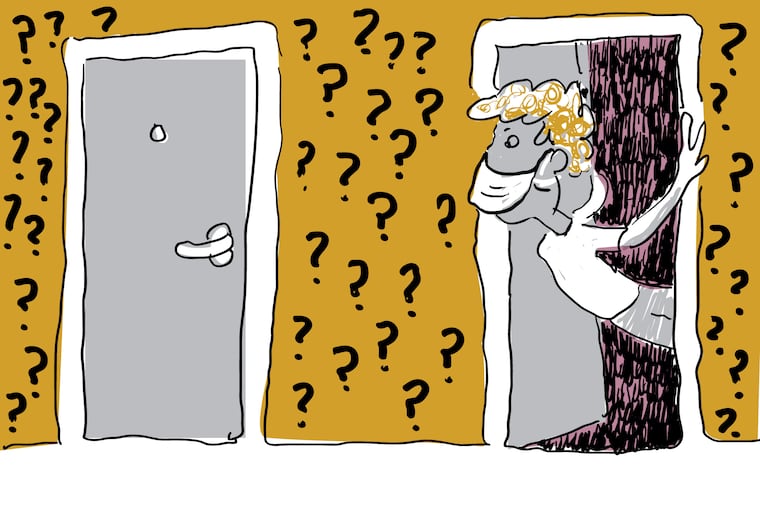You should wear a mask in hallways and other common spaces of apartment buildings, experts say
Wear a mask if you might encounter neighbors, even if it's just a short trip down the hallway or to the front lobby.

Call it the naked rule: If you have to put clothes on, you should put on a mask.
That’s the shortcut we learned from talking to experts about when, exactly, masks are needed.
After all, the general guidance — wear a mask in public — can be confusing: What exactly does public mean? What counts as leaving my home? Does it mean going outside?
Really, what it means is you should cover your nose and mouth when you might come into contact with people who don’t live with you. That’s not just when you’re going to a specific place where people are congregating, such as a store.
And for people who live in apartments or other multi-home buildings, it means wearing a mask when going to common areas where you might run into others.
“If I was in one of those high-rise apartments in the city and I had to go down to the front desk to get a package or mail or whatever, I would wear a mask,” said Thersa Sweet, an epidemiology professor at Drexel University’s Dornsife School of Public Health. “How is that any different from going to a grocery store?”
That’s because, despite how invasive their noise might be, your neighbors in other units don’t actually share your space. If one of them is sick, or you are, you’re not transferring the virus between each other normally. But you could if you encounter each other in the hallway or other common space.
» READ MORE: Your face mask questions, answered
So even if you don’t leave the building itself, or feel like you’re going anywhere — just downstairs to throw out the trash! — you should put a mask on when leaving your apartment. It’s about your possible exposure to neighbors, and lack of control over that, said Suzanne Willard, associate dean of global health and clinical professor at Rutgers School of Nursing.
“In an environment you can control, yes, that’s one thing. But once you’ve walked outside your door, there is no control anymore,” she said.
It’s not pleasant, Willard acknowledged; masks get uncomfortably hot and stuffy and make it hard to breathe, and putting them on for a short trip to pick up mail is annoying.
And it feels awkward socially, said Jen Caudle, a family physician and professor at Rowan University’s School of Osteopathic Medicine.
“It’s requiring us to behave in a way that we might feel is rude or distant or cold,” she said.
But remember that you’re trying to minimize the risk for everyone, they said. Put on a mask when you leave your apartment, even if it feels silly.
And remember that masks don’t replace social distancing, they complement it. So you should continue staying at least six feet away from others.
Oh, and if you don’t end up running into anyone — yes, you win, you told us so — that’s great, Willard said. You erred on the side of caution. You don’t need to wash your mask if you didn’t come into contact with anyone on your short trip. Consider it clean.
Unlike your hands, Willard said, unprompted.
“You should always, when you come back in, wash your hands,” she said. “You don’t know who’s been touching the outside of your doorknob.”